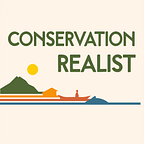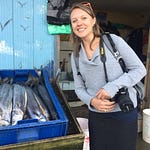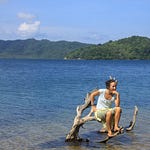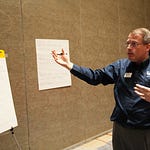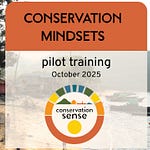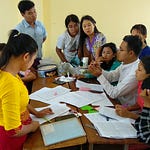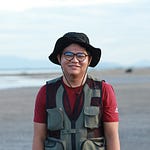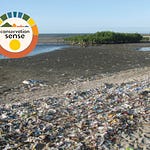A very spooky, haunted hellooooo to you all - it's a special Halloween episode of Conservation Realist! I realize it will be past Halloween by the time most of you listen to this, but hey, let's keep the celebrations going, along with the heavily discounted candies.
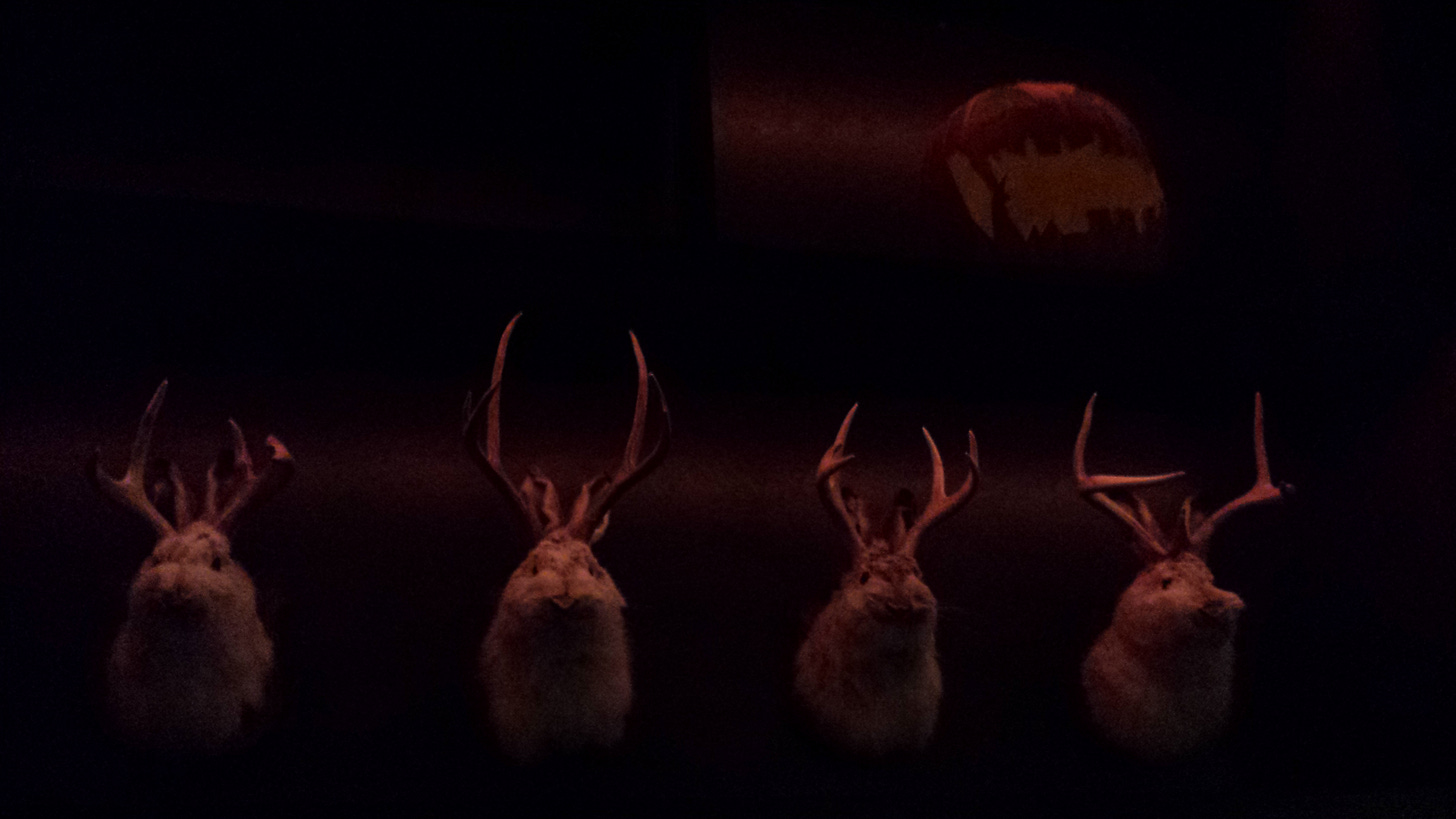
Though it would be super fun to feature stories of eerie happenings in the field, or otherworldly spiritual or mythical creatures from around the world, I'm really going to focus today on the sort of uncomfortable shadows in conservation. The hard truths and complicated questions that lurk around us, but that we - unlike imprudent horror film characters - often don't care to investigate.
And then I'll have some more entertaining snippets at the end!
What's motivating this episode? Well, I've been learning more and more about my Irish heritage, including from some cousins over there who are very attuned to the spiritual traditions of Ireland. That's how I've learned that Halloween actually originated in Ireland, as the Celtic festival of Samhain (pronounced Sauin). It's a celebration and observance of the darker time of year, a time where the veil between this world and the Otherworld is lifted and spirits - including ancestors - can move between the realms more easily.
This might remind you a bit of Dia de los Muertos, the embracing of death and connecting with ancestors. For me, really, the first time I was exposed to this notion of this time of year as a time of connection was in 2011, when I was in Manila during Halloween and All Saint's Day. I visited a cemetery as families gathered to pay respects to their departed loved ones, and it was beautiful. It was festive, with stalls selling food and light-up gadgets and candles, yet also respectful and profound. And I've increasingly grown captivated with this idea of death, darkness, and the afterlife or otherworld or underworld not as something to try to avoid or hide from, but something to accept and even embrace as part of our experience in this universe.
So, I thought it would be fitting to make this little episode to share space with some of the dark or uncomfortable questions and issues in conservation. Let's get cozy, light some metaphorical candles (or even a bonfire) as we open our minds to some of the truths that we might perhaps shy away from otherwise. Because these shadowy truths and questions will never be addressed until we learn to get comfortable facing them and engaging with them!
First question to ponder: How much are you actually willing to change in your own life to "save the world"? And how does this compare to the adjustments you expect other people to make? When you envision a "conservation solution" that requires alteration or adaptation in how communities live, are those things that you yourself would actually be okay doing?
If someone knocked on your door tomorrow and said, "So, you're going to need to stop taking flights for fieldwork, for conferences, for workshops, because it contributes to climate change," how would you react? (As a note: I fully appreciate the value of in-person interactions. And I also admit that I am not willing to stop flying, and I will not give some sort of wobbly excuse like "the things I do whe n I travel help save the world through research and sharing ideas" - and I have to accept that this is me being selfish).
For those of us in the Global North, what would you change to reduce your disproportionate impact on the planet? What privileges would you relinquish? Like, really - what would you ACTUALLY do? And what's stopping you from doing it?
On a related note: What would those of us in a position of relative privilege do to make conservation truly more inclusive? Beyond stated commitments to "diversity" and increasing travel grants to a somewhat-less-but-still-wholly inadequate level? Beyond "well, we looked into decreasing the cost of this conference for Global South participants, but it's just hard"?
And: peer-reviewed publishing. Oh my goodness, is this ever an old ghost roaming the hallways way past its time! Why are so many in this field pressured to spend an inordinate amount of time to write something in awkward academic English - and, generally, English only! - that is not necessarily widely accessible (due to cost or language or both) and not necessarily read by all that many people? And why is there so much pressure to feed into this publishing machine when it's not necessarily a particularly efficient way to get information from research into action?
Part of that, of course, is the intense competition for inadequate resources for research and conservation work. Publications help get grants and fellowships. Grants and fellowships beget more grants and fellowships. But there aren't enough to fund every truly deserving project out there - though, of course, large NGOs often spend a lot on overhead and events in the nicest hotels in town (I understand that these organizations need to uphold a reputation of prestige to impress government and private sector partners, but...still...). So, the people doing the best work in conservation often have to significantly reduce the time and energy devoted to the real work and instead scour for funding, as well as funding for workshops and conferences, as well as time (and sometimes, if the publication fee waiver isn't granted, money) for publishing.
And competition and the pursuit of prestige and recognition can give rise to the worst in us. I think many of us know at least a few conservation "heroes" who are internationally recognized, yet who aren't particularly effective conservationists and who might, also, not be particularly good or nice people. They're good at self-promotion and schmoozing. And once someone becomes recognized, they attract more and more funding and recognition, but really, it needs to be shared more widely! There aren't a relatively small number of exceptional saviors of nature. There are hundreds, thousands, and they deserve support.
And... what kind of person is usually recognized as a conservation hero? Generally some sort of nerd (sorry). Some sort of researcher. Don't get me wrong, many researchers do excellent and meaningful work in the field, but many other kinds of people do, as well. Why don't we provide better platforms for managers, rangers, and community members, who often are the ones doing the real work and the ones who will have to continue this work long after research projects are done?
Does being an expert in the natural sciences make you an expert in conservation? Then why are most of the people recognized as conservation experts primarily natural science researchers?
Who has the right to decide what happens with a species or an area or a resource? Really, who has the right? And why? And when there are competing interests, how do we decide which interest prevails? And who gets to decide that?
If you were trying to save a species, desperately, and someone in the government of the relevant jurisdiction grew passionate about it, enough to strictly enforce protections but in a way that violated human rights - what would you do? If that administration in general were known for its corruption and human rights violations, would you partner with them? Where would you draw the line in how much you cater to them in order to get your work done?
And how can we ever get a handle on what we're doing in conservation if proper monitoring and evaluation are rarely conducted?
My final spooky question of the episode - of course, there are many more that are possible! - is this: Do you dare to face all of these shadowy questions? And do you dare to trust and honor your own intelligence, training, experience, and motivations, but balance them with humility and curiosity and determination to change the things that are difficult? And do you dare to try to make the conservation world a bit brighter for it?
This notion of sitting with the darkness is actually very much aligned with the spirit in which I conceived of Conservation Realist. These dark, so-called scary things don't seem so terrifying when we acknowledge and even welcome them. We do ourselves, and our work, a disservice by a forced sunny outlook, by labeling anything that isn't "optimistic" as "doom and gloom." So, I don't want you to leave this episode feeling immensely depressed; rather, I hope to challenge you to renew your determination to do work that really matters and to work toward bettering the field in general, even if it is only in relatively small, specific ways.
So. I promised some more fun little snippets of spirit tales and experiences, and these are just a subset of things I've experienced and learned about (having worked in Southeast Asia, where there are many rich traditions of spirituality and animism, there is a lot more to share than I could do justice to here!).
While I was studying Irrawaddy dolphins in the Mahakam River, as a very appreciative collaborator to the wonderful Danielle Kreb of Yayasan Konservasi RASI in Indonesia, my team and I lived on a floating house that was tethered to the river banks of a small village. It was right next to a dolphin highway, with dolphins passing by regularly, including at night when we couldn't see them in the dark but could only hear their blows.
Well, it turns out that that's not the only thing I wasn't able to see out there. Apparently, there was a ghost or spirit of an old man who would regularly fish from the deck or patio of the house. The locals around me would casually mention to each other, "Oh, yes, I saw the old man out there last night," and "Me, too!" while I had also been out during the night and hadn't seen anything. It just made me feel very left out, very unattuned.
Over in the Philippines, on the mango-yielding island of Guimaras, I apparently had a run-in with spirits, but I wish I hadn't in that case. We were doing interviews in a village when I suddenly had sharp stomach pangs. Perhaps too much 3-in-1 coffee, a staple served to us in many households we visited? I barely made it through the trike ride back to our apartment, where I then ran into the bathroom and vomited. I was miserable. My sister, who was on my field team, soon got sick herself.
Later that day, I was able to get myself out of bed long enough to slowly walk to the market to pick up some ginger and other basic goods for the two of us. I heard my field assistant, Aisa, yelling my name, and turned to see her running after me. "Mam Tara! You need ginger!"
"Yes, I have some here - it's good for the stomach, right? I'll make some tea."
"No, not just like that! I will take it to my teacher - I am also an apprentice in witchcraft - and they will bless the ginger to keep you safe from spirits."
"...what."
"Where is your shirt? I need your shirt."
"The one I'm wearing now? Um..."
"No, the one from when you got sick!"
So I went back to the apartment to get my shirt from earlier, and Aisa took it so that her teacher could do whatever necessary to it and the special ginger. She brought it back to me with strict instructions to sleep with the ginger, wrapped in the shirt, under my pillow. And then we had to carry blessed pieces of ginger in our pockets from then on.
Apparently, the village where I'd started feeling sick was known for having spirits that entered the bodies of outsiders. At any rate, I did feel better the next day, and though the role of the blessed ginger in that turnaround is unclear, I appreciated learning something new. Some months later, I found a dried up nubbin of ginger in one of my field pants that had somehow survived various rounds of washing.
And this one is more personal. I was in Myanmar, having just returned after my father's death in San Diego. I was wrecked by grief, and also sort of numb in the face of feelings that were so much more expansive than I'd ever imagined my emotional universe could be. I was reeling from the realization of how very difficult this grief would be, across the world from my family, when I went to the local supermarket - one of the first outings I could really manage.
I was walking by the furniture aisle, which had all sorts of small-ish foldable plastic furniture, including little knee-height tables that often featured super-saturated, even gaudy, landscapes. One such table immediately caught my eye: its landscape was a view I knew very, very well - over the aloe flowers on the cliffs of Scripps Institution of Oceanography, out to the ocean and La Jolla Cove in the distance, right near where my postdoc office used to be. I'd never seen anything like it in the store before, and never saw it again. It felt like a message or a kindness, somehow. It helped give me the courage to stay on, and in the next year or so, I managed to achieve some of my most meaningful conservation work ever. I like this story because, even though I give us as the conservation sector a bit of a tough time with challenging questions and realism, we are humans too, and we need support in this work, even if from other realms.
I was also hoping to share a bit about spirituality and its role in conservation, but candidly, my experience with this is fairly limited, and I don't currently have the time to learn enough to do it justice. And maybe you think that this "spiritual stuff" is woo-woo - irrelevant, unserious, not worthy of consideration. But I think it's actually quite instructive to at least entertain the notion, even if only as a thought exercise, that there are spiritual forces that we don't fully understand or might not even notice. It is a good exercise in humility, in holding spaces for ways of thinking and working and being that you might not be directly familiar with yourself but that are valid and important nonetheless. I especially encourage natural scientists to engage in this kind of exercise, because for some natural science folks, social science and qualitative data are also seen as "out there" abstractions, when in reality they are actually incredibly important.
My family is going to observe tonight with a small bonfire and lighting candles at an altar for my dad and our ancestors. And I encourage all of us to keep exploring the dark shadows of things we might initially avoid - the uncomfortable questions and awkward truths - because there is a real strength to be gained from doing so.
Enjoy the darkness, my friends! And we'll meet again over some conversations - three more for this season, to be exact - starting next week. Take care!

